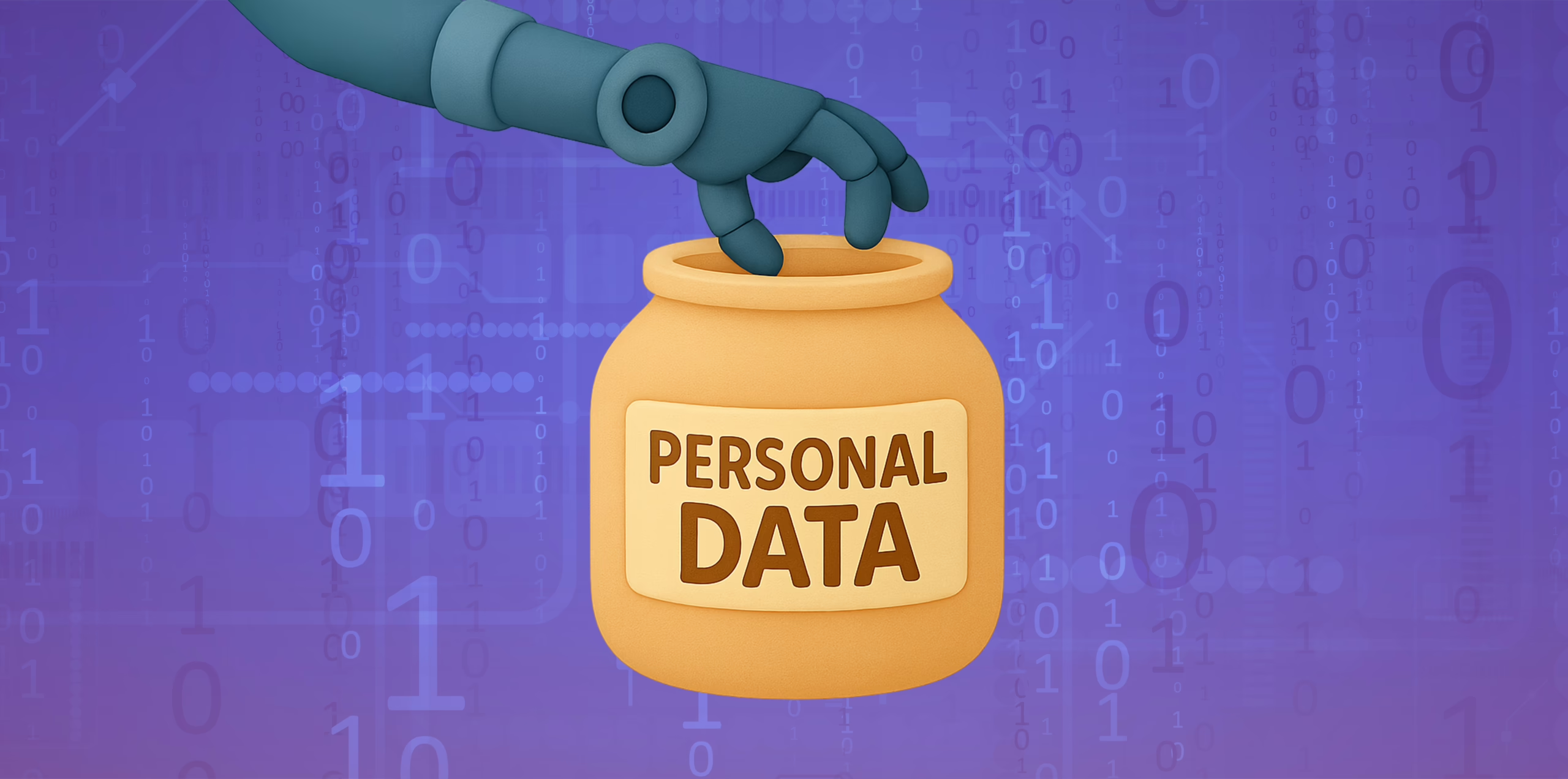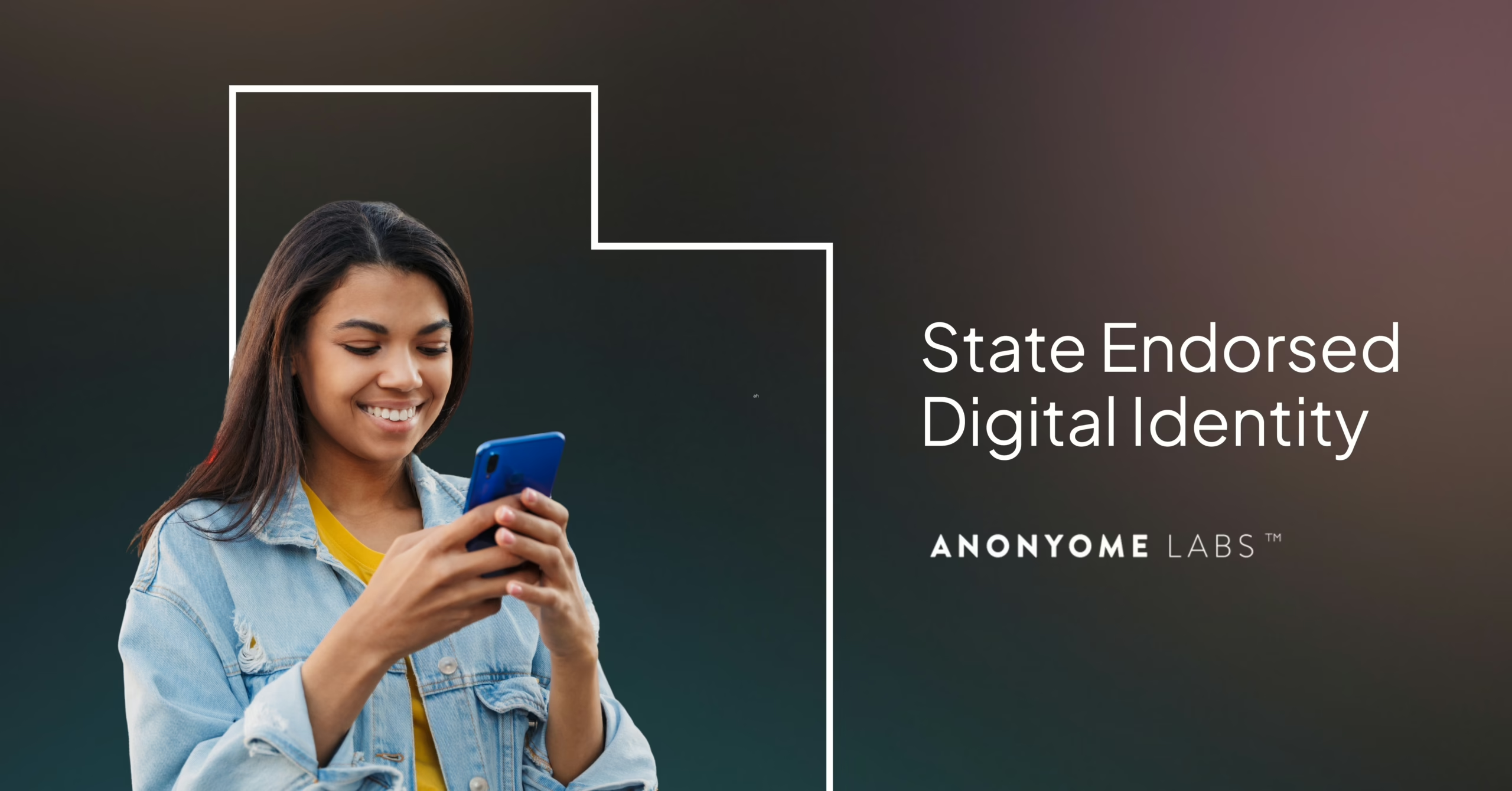Every year artificial intelligence (AI) is doing more, delivering better, and becoming faster. Apple says the AI revolution is “as big or bigger” than the internet, smartphones, cloud computing, and apps. Microsoft says AI technology will change every part of our lives. But our personal information is fuelling the AI revolution—and that presents massive AI privacy risks.
Without our consent, companies are scraping our personal information from across the internet and using it to train AI systems—and that’s just one way AI threatens personal privacy. Here we look at the long laundry list of AI privacy threats in 2025 and the tools you need to fight back.
12 AI privacy threats—and counting
Everything we do generates data—and AI systems scrape, link together, and thrive off that data.
AI uses our information to both understand what we want from it and to perform its tasks. We give AI our data intentionally (e.g. by writing prompts containing personal details) and unintentionally (e.g. by being near facial recognition technology such as a Ring doorbell).
But AI privacy and security threats don’t only stem from what we share with AI but also from how AI can analyze, infer, and act on that information without permission.Academics have identified at least 12 privacy risks from AI:
- AI collects massive amounts of data from everywhere, increasing risks of surveillance. AI can harvest phone numbers, emails, and personal information and images from websites, social media, and public records.
- AI automatically links identity information across various data sources, increasing risk of personal identity exposure. Using pattern recognition, AI can match and correlate scraped data from scattered sources and readily knit it together into a clear profile of a person.
- When AI combines data about a person, it makes inferences from it, boosting the risks of privacy invasion.
- AI infers personality or social attributes from physical characteristics, potentially leading to bias and discrimination.
- AI repurposes data beyond its original intended use, further eroding user control.
- AI has opaque data practices which fail to inform and give users control over how their data is used.
- AI storage practices and data requirements risk data leaks and improper access.
- AI can reveal sensitive information, such as through generative AI techniques.
- AI’s ability to generate realistic but fake content makes it easier to spread false or misleading information.
- AI can cause improper sharing of data when it infers additional sensitive information from raw data.
- AI makes sensitive information more accessible to a wider audience than intended.
- AI technologies invade personal space or solitude, often through surveillance measures.
One rapidly growing impact of AI data gathering is targeted scams and phishing. AI makes fraud more convincing by using readily available personal data to tailor attacks. AI-generated voice deepfakes, and deepfake texts, emails and web sites promoting fake products, deals and giveaways are part of the highest reported form of scam, according to the FTC.
Artificial intelligence (AI) is the ultimate data broker
If you think about it, AI is the ultimate data broker.
Data brokers are companies that harvest, manipulate and even misrepresent consumer data and sell it to companies, usually for marketing. Data brokers are legitimate but unregulated businesses, there are about 4,000 of them worldwide, and their industry is worth about US $200 billion annually. The largest data brokers, such as Acxiom, have tens of thousands of servers collecting and analyzing thousands of data points per person from hundreds of millions of consumers globally.
AI systems basically do the same thing—and in turn data brokers are using AI to boost their success rate and profit margins. According to the Bureau of Investigative Journalism, “a rapidly growing industry has also sprung up to broker training data to AI companies with more niche requirements. Some of the datasets you can buy on this marketplace include images of conflict, protest crowds, adult content, audio datasets of recorded phone conversations on various topics, and social media posts classified by the sentiment they express.”
Auto opt-in to AI training is a big issue
A recent deep dive into how to stop AI from getting its bots on your personal data by The Guardian says default opt-ins are an industry-wide issue. It says a recent report by the FTC on the data practices of nine social media and streaming platforms including WhatsApp, Facebook, YouTube and Amazon “found that nearly all of them fed people’s personal information into automated systems with no comprehensive or transparent way for users to opt out.” The article gives instructions for opting out of the major platforms but warns it’s not easy.
Wired ran a similar article on how to opt out of AI training and covered more platforms including Figma, Adobe, Grammarly, Google Gemini, LinkedIn and loads more.
The article also has instructions but warns consumers to be realistic about the fact that the horse has already bolted.
“Any companies building AI have already scraped the web, so anything you’ve posted is probably already in their systems. Companies are also secretive about what they have actually scraped, purchased, or used to train their systems,” the Wired guide notes.
How to protect your personal information from AI
You can use The Guardian and Wired’s instructions for removing your data from AI training on all the major platforms, but there’s an easier strategy going forward: don’t expose your personal information in the first place. How do you do that? Use MySudo, MySudo Reclaim, and the rest of the MySudo suite. And note: this strategy for protecting your personal information from AI is the same strategy you’d use to protect your personal information from the surveillance capitalism machine that is big tech and others that profit from your personal data (even your bank!).
How MySudo protects your personal information from AI
MySudo is a privacy app that gives you up to 9 separate Sudos—secure digital profiles with phone, email, and payment cards to use instead of your own. Anywhere you would usually give your personal details, give your Sudo details instead.
Each Sudo has:
- 1 customizable phone number*
- 1 email address
- 1 virtual card*
- 1 private browser
- 1 handle**
In the AI era, Sudos are powerful because they:
- Separate your identity from your activity:Each Sudo is compartmentalized. If you use one for online shopping, another for dating apps, and another for networking, for example, AI scrapers can’t easily link them together and build a profile on you.
- Limit your exposure: Instead of sharing your real phone number and email all over the internet, you share your alternative Sudo details, which breaks your data trail.
- Offer strong security: You can use a dedicated Sudo number for 2FA and account recovery, keeping your real number out of the databases that AI systems analyze.
What’s more, MySudo is an immediate safeguard for you and your family against voice deep fakes like the popular grandparent scam. To protect yourself:
- Set up a Sudo and assign it a phone number that you only ever give out to your closest family and friends.
- Be diligent about only giving out the number to your loved ones so that you build and protect a trusted communication channel with your inner circle.
- If you have only carefully shared the Sudo number with those you trust, then you’ll know if that number rings, it’s a legitimate communication from within your circle and not a deepfake scammer impersonating you or your loved ones. If you’ve been diligent in protecting your safe Sudo number, it is very unlikely a criminal would have it.
- Invite your family and friends to use MySudo and use the app’s phone numbers or handle-based end-to-end encrypted calling to communicate with each other.
How MySudo Reclaim adds another layer of protection
The MySudo suite includes the MySudo app’s companion product, MySudo Reclaim, which helps you take back your personal data that AI systems mine (and bad actors can use for scams with or without AI).
MySudo Reclaim helps by:
- Helping you to identity where your data is being held.
- Monitoring continuously to make sure your details don’t reappear or pop up anywhere else.
- Reducing the raw material AI can use to track, profile, or impersonate you.
By cutting your data off at the source, MySudo Reclaim ensures there’s less for AI—and bad actors—to exploit.
Why you need both MySudo and MySudo Reclaim to protect against AI privacy risks
Together, MySudo and MySudo Reclaim provide a two-pronged defense against AI-driven privacy risks:
- MySudo prevents new exposure of your information by giving you secure, alternative phone numbers, email addresses, and virtual cards, which you can compartmentalize by Sudo (e.g. one for shopping, dating, networking, travel etc.), breaking your data trail and making it difficult to profile you.
- MySudo Reclaim cleans up your existing digital footprint by removing personal data from public access.
The result? Less exposure, less linkage, and more control over how your personal data exists in an AI-driven world. The horse might have bolted for AI data use, but you can have a second chance at digital privacy with MySudo and MySudo Reclaim.
You might also like:
4 Ways MySudo Email is Better than Masked Email
How to Get 9 “Second Phone Numbers” on One Device
The Shocking Facts our CEO told Naomi Brockwell About Cell Phones
* Phone numbers and virtual cards are only available on a paid plan. Phone numbers available for US, CA and UK only. Virtual cards for US only. ** Handles are for end-to-end encrypted comms between app users.



